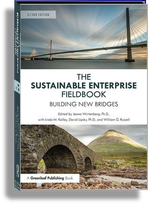CHAPTER 5 : EMPLOYEE ENGAGEMENT FOR A SUSTAINABLE ENTERPRISE
|
ACTIVITIES
|
|
CASE EXAMPLES
|
Supplemental Resources

Recommended Articles
- HR’s Role in Building a Sustainable Enterprise: Insights From Some of the World’s Best Companies : Sustainability—balancing social, environ-mental, and economic factors for short- and long-term performance—is a critical issue for the world and for business. We interviewed key executives at nine of the world’s most “sustainable” companies to examine important issues about their sustainability journeys and the role Human Resources is playing.
- What Drives Employees to Sign on for Sustainability (2016): This exploratory study examines how sensemaking and organizational identification occur inside an organization and how they can affect how employee engagement takes place. Qualitative data suggest the effect of organizational identification on support for sustainability action and, conversely, how sustainability actions may in turn affect organizational identification. The findings from interviews of a sample of 8 companies reveal many different goals, challenges, and qualitatively different means of seeking sustainability. Analysis points toward the dynamics of cognitive and emotional processing, suggesting implications for practitioners and further research.
- Going Beyond Nudging, Gaming and Competing Renee Lertzman SB (2015): An Open Discussion about Designing Real Engagement
- Fast Forward: The Future of Work (October 2014): "What was unexpected, but became clear through this research, were deep attitudinal changes occurring across geographies and generations to seek greater meaning and joy from work and the places of work. In 2030, the many places where we work and live will be diverse and entwined: humanity, creativity, culture and community will be integral"
- Future of Work: 2015-2020 (Winter 2014): Rather than add to all the hyperventilating about the disruptive changes that will impact and reimagine the Future of Work... We studied what it will take to make those disruptive changes work and what matters in the future of work.
- HRM's Role in Corporate and Environmental Sustainability (2012): The HR function is critical to achieving success in a sustainability-driven organization. Sustainability practice pervades every aspect of doing business and needs to be embedded across an organization at all levels, becoming an ongoing change process. Since the prime focus and skills of HR professionals include organizational process, change management and culture stewardship, they should take a leading role in developing and implementing sustainability strategy. This report aids human resource management (HRM) practitioners in understanding sustainability in an organizational context. It can be used as a guide for the HR function to support sustainable business and perform HRM sustainably.
- People Matter, World Business Council for Sustainable Development (August 2010): People Matter is a project to explore the link between talent skills and sustainability. Through this project, leading companies are sharing experience and developing thought leadership on how to prepare, engage, train, motivate, reward employees around sustainable development
- The Business Case for Environmental and Sustainability Employee Education: (February 2010): "Environmentally educated employees can improve a business’ profitability and help it retain skilled workers, improve community relations and reach its sustainability goals"... The “business case” — that is, the quantification of opportunities and risks — for environmental and sustainability education might not yet be heavy on data. But anecdotes from around the world give clear indications that teaching employees to conserve, recycle, improve efficiency and reduce waste, among other actions, have benefits for employees, companies and communities.
- Toward Engagement 2.0 (September 2011): Companies recognize that greening their products and operations is a source of value and that all employees must be engaged in the effort to ensure its success. Since beginning this work four years ago, NEEF has observed that the practice of environmental and sustainability (E&S) employee education and engagement has spread rapidly and evolved into a more institutionalized element of companies’ broad sustainability strategies. We call this next version of employee engagement,“ Engagement 2.0.
- Educating for a sustainability mindset : Organizations around the world have become increasingly concerned about managing for sustainability, yet undergraduate education about sustainability often presents the challenge of dealing with students equipped with a modest understanding of business and sustainability issues and whose awareness is sometimes politicized. Traditional-aged students are at a stage where they derive their own worldview on many subjects, including their place in a broader world. As such, equipping them to be useful professionals for the future, or even to specialize in sustainability- oriented careers, requires raising their awareness of the global situation in environmental, societal, political, and business terms. A curriculum must get them acquainted with what is needed for the world to reach a more fruitful future as well as with strategies the business sector can pursue to accomplish such an objective. More importantly, however, it should elicit a new worldview about sustainability and, even more profoundly, a deeply felt mindset embracing one’s purpose, feelings, and identity. This article thus proposes a means by which students can embody the ability and confidence to make an appreciable impact toward a sustainable planet.
